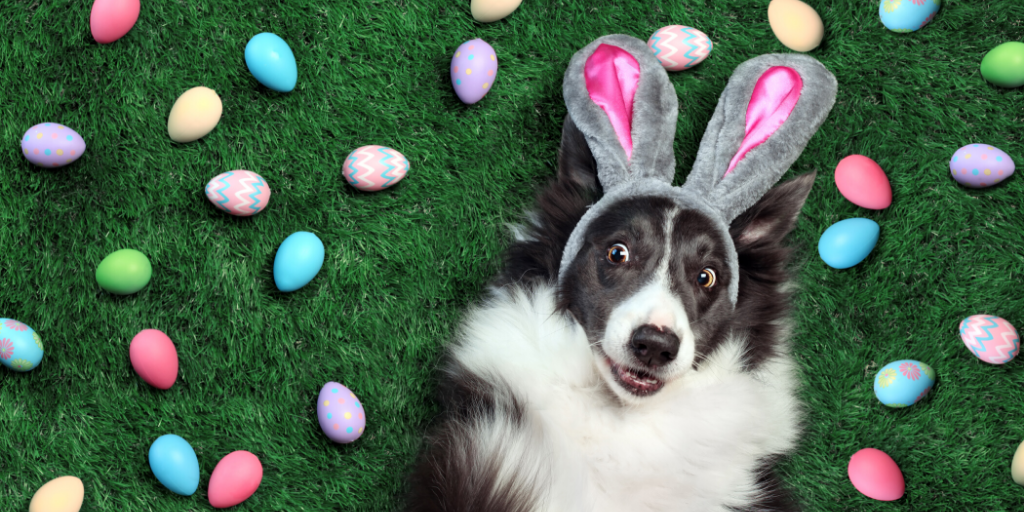Easter is a holiday filled with chocolate, egg hunts and bunnies. While these things may be fun and harmless to us humans, the same cannot be said for our canine companions. Here are 10 things to keep away from your pets for a safe and fun Easter for all to enjoy.
1. Chocolate
Easter baskets are usually filled with delicious chocolates. But chocolate is dangerous to dogs (something you probably already know as a dog owner). It's toxic because it contains theobromine and caffeine, which stimulate a dog's nervous system, causing other issues to occur. Signs of chocolate poisoning include diarrhea, vomiting, hyperactivity, increased or abnormal heart rate, pancreatitis and seizure.
Pro Tip: The darker and more bitter the chocolate, the more toxic it is to dogs.
2. Other Candies & Treats
You can also often find other candies and baked goods in Easter baskets. These are also dangerous to dogs, as they often contain a toxic sugar substitute called xylitol. Xylitol releases insulin into a dog's bloodstream, which can cause a sudden drop in blood sugar, liver damage or failure and death. Even small amounts of xylitol are toxic to dogs. Symptoms of xylitol poisoning include vomiting, lethargy, weakness, loss of coordination and seizures and liver failure.
Pro Tip: If you think your pet has ingested something toxic, call your vet immediately or a poison hotline, like ASPCA Poison Control Center.
3. Easter Basket Grass
A lot of people choose to put fake grass in their Easter baskets but this can be a hazard for dogs. Some dogs may find the cellophane strands and try to chew and swallow them. This can cause your dog to choke or lead to intestinal obstruction, which often requires surgery to remove. Signs your dog ingested fake grass include vomiting, dehydration, loss of appetite, pain, bloating and more.
4. Plastic Easter Eggs
The same goes for plastic Easter eggs, which can also be dangerous to dogs - especially if your dog is a chewer. Plastic eggs can be a choking hazard for dogs and, if swallowed, could cause intestinal obstruction. You'll also need to be extra careful with plastic eggs if you put chocolate or candies inside them.
Pro Tip: For a safe at-home Easter egg hunt, hide the eggs in the yard or an area of the house you can barricade your dog away from. And make sure you keep track of the eggs you hide - both the number and location.
5. Food Coloring
Most food coloring used to dye eggs is safe for consumption, but it's still a good idea to make sure you're buying non-toxic coloring. That being said, some research has found certain food dyes to be carcinogenic in mice, raising concerns for other pets. Because of this, it's best to monitor your dog when using the coloring to dye eggs.
6. Easter Lilies
The lily is a traditional Easter flower, representing hope and love. It's a very popular decoration and gift for the holiday. But lilies are considered poisonous to dogs (and highly toxic to cats). These flowers can cause gastrointestinal upset, vomiting, diarrhea, decreased appetite, excessive drooling, irritation of the mouth (which is usually accompanied by pawing at the face), and potential heart problems. Symptoms typically begin to show up within two hours of ingestion. If you notice any of these signs, contact your vet immediately.
7. Human Foods
Holiday meals are delicious to us, but can be dangerous to our dogs. Fatty meats (like ham or lamb) can cause gastrointestinal upset, vomiting, bloating, abdominal pain, loss of appetite, dehydration, lethargy, weakness, and pancreatitis. It's important to note that when a dog ingests fatty foods, it could require intense medical care or even surgery.
Holiday foods also tend to include flavorful additions like onions and garlic or chives and leeks. These are all members of the allium family and toxic to dogs, often causing gastroenteritis and hemolytic anemia. Signs your dog has ingested an allium vegetable include nausea, vomiting, diarrhea, excessive drooling, lethargy, abdominal pain, pale gums, panting and increased heart rate. Contact a vet immediately if your dog has ingested an allium vegetable.
Pro Tip: Do not feed your dog bones from food, such as ham or lamb. These cause choking, injury to your dog's mouth or throat, or intestinal obstruction.
8. Alcohol
Although rinks are a great way for humans to get festive, they're not good for our pets. If ingested, alcohol can cause depression, clumsiness and unsteady walking, vomiting, decreased blood pressure and body temperature, damage to the liver or nervous system, and even death in small breeds.
9. Guests
Dogs have unique personalities, which means some do well with new people and crowds while others do not. If your dog is more shy and timid, you may want to separate him or her in another room with water and a favorite toy. If your dog is crate trained, he or she may enjoy being in there, as it acts like a safe space. These methods can reduce stress and prevent possible conflict or injury.
10. Bunnies
Easter and bunnies go hand-in-hand. Some people even purchase real bunnies as a gift. While rabbits are cute and can make great pets, they are not for everyone - including your dog. It's not a good idea to get a rabbit if you have a dog that doesn't do well with other pets. And if your dog has a strong hunting instinct, you may not want to bring home something that resembles prey.

